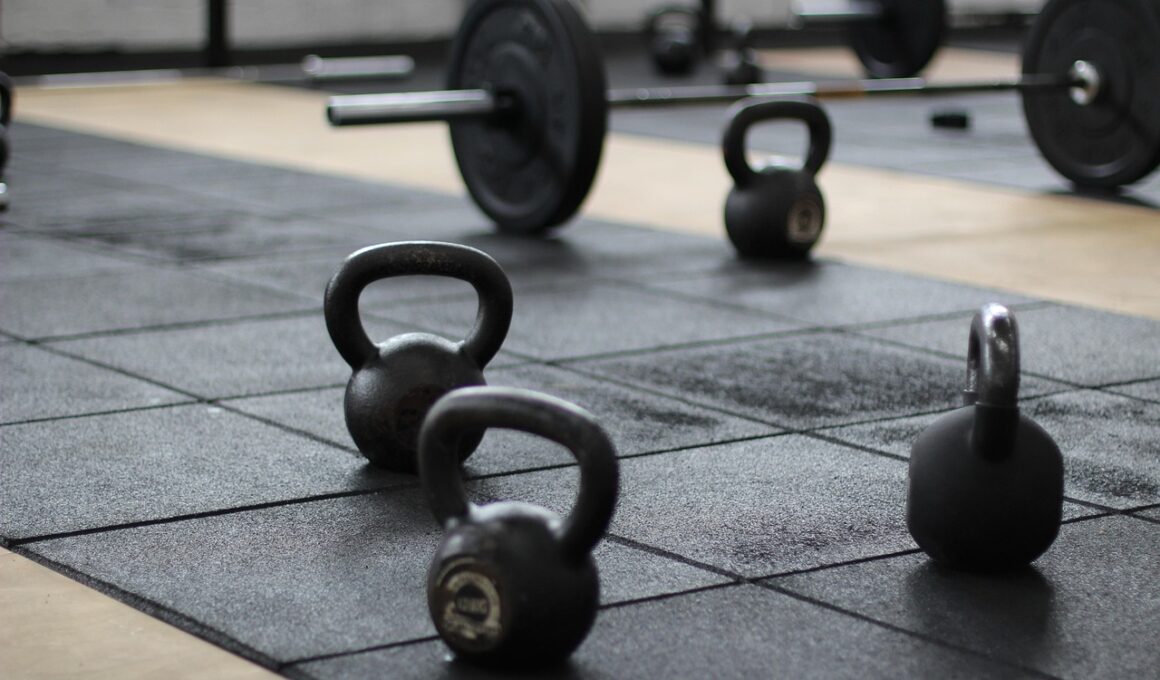Meal Planning for Busy Lifestyles to Maintain Weight
Maintaining weight in a busy lifestyle requires intentional meal planning. A well-structured approach ensures that nutritious meals remain a priority. Consider selecting a day each week dedicated to meal prep. Using that time, cook and store meals in a refrigerator for easy access during the week. This strategy can lead to less reliance on convenience foods, which often have high calorie counts. It’s also essential to focus on balanced meals. Plate combinations of protein, fiber, and healthy fats can keep you satisfied longer. Incorporate a variety of colors on your plate to enhance nutrient intake. Prepare snacks in advance to control portions and avoid unhealthy choices. Use snack bags or containers to portion out almonds, fruits or veggie sticks. Remember to drink plenty of water throughout the day; often, thirst is mistaken for hunger. Staying hydrated helps curb unwanted snacking. Additionally, consider using apps to track your intake and plan meals efficiently. Finally, be flexible; sometimes schedules change unexpectedly. Keep a few quick recipes handy for those hectic days. With thoughtful planning, maintaining your weight can fit seamlessly into any busy lifestyle.
Efficient Grocery Shopping
Efficient grocery shopping is an integral part of successful meal planning. Create a list based on your meal prep session to avoid impulse purchases at the store. Stick to whole, fresh foods to form the base of your diet while limiting processed items. It can be beneficial to shop the perimeter of the grocery store, where fresh produce, meats, and dairy typically reside. Plan your meals around seasonal products; they’re often cheaper and tastier. Don’t forget to check for sales or store discounts before shopping, allowing you to save money. Consider using a grocery delivery service if you’re short on time; this can simplify the process while ensuring you still have healthy options available. Look for services that cater to your nutritional needs. Opt for online shopping to compare prices and select the best options conveniently. When you’re at the store, take your time; rushing can lead to poor choices. Read labels to identify hidden sugars and unhealthy fats. Making your choices with clear goals can help you stick to your weight maintenance plan, ensuring you have all the necessary ingredients at hand.
Preparing quick and healthy meals is crucial for maintaining weight. It’s essential to become familiar with simple, nutritious recipes that can be made in under 30 minutes. Consider incorporating one-pot meals or sheet-pan dinners into your routine. These types of meals simplify preparation and cleanup significantly. Look for recipes featuring lean proteins such as chicken or fish, combined with plenty of vegetables to fill your plate. Quinoa and brown rice are excellent bases for many dishes, providing essential nutrients and fiber. Additionally, utilize kitchen gadgets like a slow cooker or instant pot to speed up cooking times. Meal planners can find it helpful to cook larger portions on quieter days. This allows for making multiple servings that can be frozen for later use. Having healthy frozen meals on hand saves time and helps resist the temptation of takeout food. Be prepared for unexpected evenings by keeping quick-fix ingredients in your pantry, such as canned legumes and frozen vegetables. When time permits, explore new recipes and ingredients to keep your meal planning exciting and efficient. With versatility, healthy eating can fit appropriately into any busy schedule.
Snack Smartly
Choosing healthy snacks is a critical aspect of weight management in busy lifestyles. Having healthy snacks on hand reduces the temptation to reach for junk food during your day. Aim for options that combine protein and fiber to keep you satiated. For example, pairing apple slices with peanut butter or yogurt with berries provides balanced energy. Make a list of your favorite healthy snacks to incorporate into your meal planning. Include options like mixed nuts, carrot sticks, or low-fat cheese. Batch preparation can expedite these choices; pre-portion them into containers for easy access. Think about including options that can be tossed into a bag for on-the-go accessibility, ensuring that you remain fueled without unhealthy fast food. When you stock your pantry, avoid keeping high-calorie snacks nearby. Clear out the pantry space to include nutritious alternatives only. Experiment with recipes for healthier versions of your favorite snacks, like homemade granola bars or kale chips. If you’re attending events, prepare your snacks to take along, ensuring you’re satisfied without derailing your efforts. In this way, you can indulge while still prioritizing health.
Hydration is often overlooked but plays a vital role in weight maintenance. Busy lifestyles can lead to dehydration, which can mistakenly trigger cravings for food. Ensure you’re drinking enough water by keeping a refillable bottle handy throughout the day. It should be accessible in your bag, car, or at your workspace. Set reminders on your phone if necessary to cultivate a habit of regular hydration. Additionally, infuse your water with fruits like lemon, lime, or berries to add flavor and make consumption enjoyable. Herbal teas can also serve as an excellent alternative, providing hydration with variety. Remember that calories from sugary beverages contribute to weight gain. Avoid sodas and sweetened juices that can lead to excessive calorie intake without providing satisfaction. Healthy smoothies can instead be a great option for meals but be mindful of portion sizes. Observing how your body responds to different beverages can aid in maintaining energy levels throughout the day. Creating a mental note to prioritize hydration assists your diet efforts significantly. The effects of hydration on performance and satiety cannot be overstated in these busy lifestyles.
Consistent Routine and Mindfulness
Establishing a consistent routine is essential for successful weight maintenance. Develop a meal schedule that aligns with your personal and professional commitments. A regular dining routine establishes healthy eating as part of your lifestyle. Designate specific meal times to ensure you prioritize food over distractions. This is also vital for practicing mindfulness while eating. Focusing solely on your meal aids digestion and helps you recognize fullness signals. Reducing distractions, such as screens, encourages a more acute awareness of portion sizes. Furthermore, take the time to savor each bite, enhancing your dining experience while reducing the likelihood of overeating. Mindful eating can be transformative, especially in social settings, where portion control may become challenging. Engaging in conversations during meals can promote slower eating habits. If dining out, scope the menu beforehand; opt for healthier choices that align with your goals. Share meals with others to avoid overindulgence. Idioms like, “Eat for nourishment, not just for taste” can aid in forming positive habits over time. Maintaining a robust commitment to your routine reflects your dedication to achieving your weight maintenance goals.
Finally, adapting your strategies as needed is vital in successfully maintaining your weight. Flexibility in meal planning accommodates unforeseen circumstances and various schedules. When life becomes particularly hectic, remind yourself to return to basic options developed in your earlier planning stages. Meal planning may sometimes require adjustments or alternatives based on personal cravings or weekly experiences. Stay informed about portion sizes to balance satisfaction while promoting health. Avoid rigid diets that forgo enjoyable foods and lead to annoyance over time. Instead of denying cravings, consider portion management to integrate them occasionally. Each week, reevaluate your meal plans to find the optimal combination of time-saving and nutritional choices. Learning from what worked, and what didn’t lead to awareness in your dietary lifestyle. Experiment with seasonal foods to maintain variety and excitement in your meals. Always keep an eye toward your overall energy levels and health goals. Communicating with supportive friends or family members about your intentions can reinforce motivation. Proper meal planning in busy lifestyles isn’t merely about food but a comprehensive approach that fosters a healthier living.
Ultimately, meal planning for weight maintenance in busy lifestyles requires creativity and strategy. By utilizing time-saving techniques, selecting nutrient-dense foods, and prioritizing hydration, achieving your dietary goals becomes attainable. Establishing consistent routines allows for healthy habits to flourish without feeling burdensome, reinforcing your lifestyle choices over time. Mindfulness ensures that every bite counts and fosters awareness surrounding satiety, making your diet enjoyable rather than restrictive. Flexibility helps navigate life’s twists and turns while maintaining your commitment to healthy eating patterns. Remember to celebrate victories, however small, as they motivate further progress. Revisions in your meals will lead to discoveries of preferences and dislikes, aiding your journey toward successful weight maintenance. By implementing these practices, healthy choices become second nature, offering the energy needed to navigate busy days. Allowing yourself occasional indulgence without guilt promotes balance and keeps your diet sustainable in the long run. The combination of strategic planning, mindfulness, and a commitment to adapting can positively impact your health. As you maintain your weight, you’ll also cultivate a healthier relationship with food, enabling you to thrive while living busy lives.





